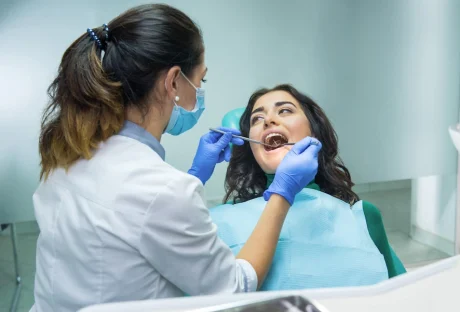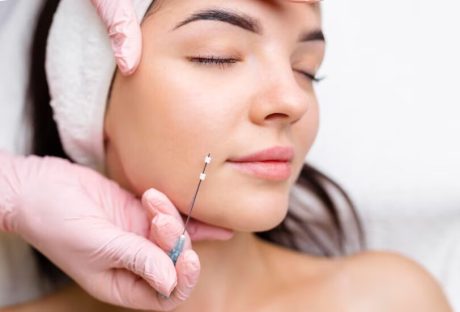Category: Health & Fitness
ContentRally is a leading source of reliable news and trending topics on Health Fitness. Get hard-to-find insights and advice on Health Fitness from industry-specific leaders.

Attracting New Dental Patients: Best Strategies For Growth
Attracting new dental patients is crucial for the success and growth of any dental practice. To stand out in a competitive market, dental practices need effective strategies to attract new dental patients and build long-term relationships with them. Here are some of the best strategies to attract new patients to dental practices. 1. Online Presence and Marketing In today's digital age, having a strong online presence is essential. Create a professional website that's informative, visually appealing, and user-friendly. Optimize it for search engines to improve visibility. Utilize social media platforms to engage with potential patients, share oral health tips, and showcase your expertise. Online advertising and search engine marketing can also be effective in reaching a wider audience for practices that need more dental patients. 2. Local SEO Implement local search engine optimization strategies to ensure your dental practice appears in local search results. Register your practice on Google My Business and other local directories. Include accurate contact information, hours of operation, and patient reviews. Encourage satisfied patients to leave positive reviews, as they can significantly impact your online reputation. 3. Referral Programs Word-of-mouth recommendations remain one of the most powerful marketing tools. Offer referral incentives to existing dental patients who refer new patients to your practice. This could be a discounted service, a free dental cleaning, or a gift card. Implementing a formal referral program helps motivate patients to spread the word about your practice. 4. Community Involvement Engage with the local community by participating in events and initiatives. Sponsor local sports teams, schools, or charity events. Offer free dental screenings or oral health presentations at community centers, schools, or local businesses. These activities not only enhance your visibility but also demonstrate your commitment to the community's well-being. 5. Patient Education Develop educational materials, such as blog posts, videos, or infographics, that provide valuable information about oral health and dental procedures. Share these resources on your website, social media, or through email newsletters. By positioning yourself as a reliable source of information, you can attract dental patients who are actively seeking dental care and are interested in learning about oral health. 6. Online Appointment Booking Simplify the process of scheduling appointments by implementing an online appointment booking system. This convenience is appreciated by busy individuals who prefer the ease and flexibility of booking appointments at any time. Make sure the process is user-friendly and offers clear instructions. 7. Exceptional Patient Experience Providing exceptional patient experiences is crucial for attracting and retaining patients. Ensure your staff is friendly, knowledgeable, and responsive. Create a comfortable and welcoming environment in your practice. Communicate clearly with patients, addressing their concerns and explaining treatment options. Offer amenities such as comfortable waiting areas, complimentary refreshments, and entertainment options. 7. Special Offers and Promotions Consider offering special promotions or discounts for new patients. Those could include discounted initial consultations or teeth whitening treatments. These incentives can entice potential patients to choose your practice over competitors. 8. Patient Testimonials Encourage satisfied dental patients to share their positive experiences through written testimonials, video testimonials, or online reviews. Testimonials act as social proof of dental practices' credibility and service. They can significantly influence potential patients when choosing a dental practice as well. 9. Continuous Professional Development Consider staying updated on the latest advancements in dentistry and investing in ongoing professional development for yourself and your team. Being knowledgeable about the latest treatments and technologies demonstrates your commitment to providing high-quality care. In turn, it can attract new patients seeking modern and effective dental solutions. 10. Effectively Retaining Existing Patients and Bringing in New Ones Implementing these strategies can help dental practices attract new patients and establish a strong reputation in their communities. By focusing on providing exceptional patient experiences, utilizing online marketing strategies, and engaging with the local community, dental practices can differentiate themselves from the competition and foster long-term relationships with their patients. Remaining up-to-date on the latest technologies and techniques and staying in touch with consumers' needs can foster growth as well. Read Also: Best Paying Jobs In Medical/Dental Instruments Is Medical/Dental Instruments A Good Career Path How Many Jobs Are Available In Medical/Dental Instruments?
READ MOREDetails
What Should I Do After A Chiropractic Appointment?
Kudos for deciding to seek consultation with governor's family chiropractic to improve your musculoskeletal health! Following a chiropractic visit, it's crucial to assist your body's recovery to maximize the therapeutic effects. However, while the chiropractor's experience and treatment plans are essential, what you do following the session can also impact your general health and treatment outcome. A typical chiropractic session consists of many steps intended to evaluate and treat your musculoskeletal health. What to anticipate at a regular chiropractic appointment is as follows: Preliminary Advice The chiropractor will start by reviewing your health history, present symptoms, and any particular worries you might have. Using this information, they can better comprehend your illness and devise an effective treatment strategy. Visual Inspection The chiropractor will do a thorough physical examination that may involve measuring your range of motion, examining your posture, and running neurological and orthopedic evaluations. Furthermore, they could palpate or examine the spine and surrounding structures to find any tension, soreness, or misalignment. Diagnosis In some circumstances, the chiropractor may ask for diagnostic testing to learn more about your issue, including MRI scans, X-rays, or laboratory tests. They could identify any structural underlying problems or diseases that can affect your therapy with these tests. Formulation Of A Treatment Plan The chiropractor will create an individualized treatment plan catered to your particular requirements based on the results of the diagnostic tests and examination findings. This strategy could incorporate different chiropractic methods, treatments, exercises, and lifestyle advice. Chiropractic Procedures Chiropractic adjustments or spine manipulations are among the primary therapies they offer. These adjustments include the chiropractor applying controlled force to certain areas in the spine or various regions of the body to resolve misalignment, enhance joint mobility, and relieve pain. Additional Options The chiropractor may combine additional therapy with adjustments, depending on your situation. These might include ultrasound therapy, spinal decompression, soft tissue therapies (like myofascial release or massage), electrical stimulation, cold laser therapy, or even ordering a standing desk for work. In addition, these treatments intend to lessen inflammation, encourage healing, and enhance general musculoskeletal function. Self-Care Guidelines And Education Chiropractic professionals frequently offer instruction on good posture, body mechanics, ergonomics, and exercises to go along with your care. They could also recommend diet, stress reduction, and lifestyle changes to improve your general well-being. Follow-Up Consultations The chiropractor may advise several follow-up visits, depending on the severity of your ailment, to check on how you are faring and make any required modifications to your therapy regimen. These consultations allow continued evaluation, therapy, and support. Following some instructions after a chiropractic visit is crucial to optimize the advantages and aid your body's recovery process. Here is a list of measures you need to take: Observe Post-Appointment Guidelines You should pay close attention to your chiropractor's advice and adhere to their suggestions. This process might involve changing your regular schedule or performing workouts and stretches at home. Concentrate On Staying Hydrated A chiropractic adjustment may cause modifications and modifications in the body, which may affect the flow of bodily fluids and general health. Staying hydrated stimulates healthy blood circulation, encourages the supply of necessary nutrients to the tissues, and aids in toxins and waste products removed from the body. Consume plenty of water to keep hydrated and aid your body's recuperation processes. Healthy circulation, lubricated joints, and general wellness strictly depend on proper hydration. Rest And Let Your Body Recuperate After the visit, let yourself have time to relax and heal. Don't do any demanding workouts or activities that might put stress on the parts of your body that have undergone treatment. It's best to let your body acclimate to the adjustments made. Use Heat Or Ice Therapy You can treat any soreness or inflammation using cold or heat therapy, particularly if your chiropractor recommends it. To soothe sore muscles and promote blood flow, place an ice pack wrapped in a small towel on the affected region for 15-20 minutes at a time. You may also use a heating pad set on a low setting. Maintain Proper Posture Keep tabs on your balance all through the day and strive to maintain it. Try to avoid slumping or sitting for long periods without getting up. To maintain proper posture, use ergonomic aids like a lumbar cushion or chair that you can adjust. Refrain From Straining Or Heavy Lifting Following your chiropractic visit, avoid doing activities that stress your spine too much, such as heavy lifting. Allow your body to adjust, and try not to reverse any gains achieved during the adjustment. Furthermore, you could use the proper body mechanics when lifting things to reduce the stress on your back. Lift employing the power of your legs while bending your knees and maintaining a straight back. Use your core muscles for stability, and refrain from twisting when lifting. Discuss Any Concerns After your treatment, notify your chiropractor if you encounter any strange or alarming symptoms. They can answer your questions, give you more direction, or modify your treatment plan. Follow-Up Consultations Attend any suggested follow-up visits to track your development and guarantee continuous improvement. Chiropractic adjustments regularly can assist in preserving spinal health and avert future problems. You may maximize the advantages of chiropractic therapy, preserve the results attained, and advance long-term spinal health by attending follow-up sessions and, according to your chiropractor's suggestion for continued care. Keep in mind that chiropractic therapy is a collaboration between you and your chiropractor; thus, the best results will come from active involvement in your treatment plan and honest communication with your chiropractor. Consistently Living Healthy Cultivate a healthy lifestyle to complement your chiropractic therapy. This process includes regular exercise, a nutritious diet, adequate rest, and controlling stress. Maintaining a healthy routine can promote overall well-being and help chiropractic treatments work more effectively. The Bottom Line Taking cautious measures in your post-care regimen is crucial for enhancing the therapeutic effects of chiropractic adjustment and fostering optimum musculoskeletal health. You may continue to benefit from chiropractic care and take advantage of better spine health for years to come by adopting these post-appointment techniques into your everyday routine. Read Also: American Healthcare And Its Woes How To Care For The Elderly: Tips For The Caregivers
READ MOREDetails
Choosing The Best Dental Care In Gramercy
The lovely Gramercy neighborhood, located in the center of Manhattan, is well-known for its old brownstones, tree-lined streets, and active community. Both locals and visitors can find comfort in the presence of top-notch dental treatment despite the busy environment. This article will examine the field of dentistry and the outstanding Dentists in Gramercy who serve the community by offering first-rate oral health care. Gramercy offers the following comprehensive dental health services: Cutting-Edge Facilities Numerous dental offices in Gramercy are outfitted with cutting-edge equipment and contemporary technologies. These facilities put the comfort of their clients first and provide a wide range of services, from standard checkups and cleanings to cutting-edge cosmetic and restorative procedures. Dentists With Experience And Knowledge The dentists in Gramercy are renowned for their skill, extensive training, and dedication to providing customized service to each patient. To guarantee that their patients receive the best care possible, they have received extensive training and continue to learn about the most recent developments in dentistry. Future-Focused Approach Whether you need preventive care, aesthetic improvements, or restorative operations, they offer complete dental care customized to a person's needs and interests. Dental offices in Gramercy commonly offer the following procedures: Regular dental checkups and cleanings: Good dental health starts with routine examinations and cleanings. Gramercy dentists provide thorough examinations, evaluating the overall health of your teeth and gums and doing expert cleanings to get rid of plaque and tartar accumulation. Cosmetic dentistry: Gramercy's dentists are experts in this field and help customers obtain the smiles of their dreams. They use cutting-edge methods to improve the looks of your smile, including porcelain veneers, teeth whitening, and smile makeovers. Restorative dentistry: If you have dental damage, tooth rot, or missing teeth, Gramercy's restorative dental services can help you regain your oral health and functionality. These include root canal therapy, dentures, crowns, bridges, and dental implants. Emergency Dental Care: Painful and uncomfortable dental crises can happen anytime. The dental offices in Gramercy know the urgency of such circumstances and provide quick and effective emergency dental care to reduce pain and address the problem as soon as possible. A Focus On The Patient They place a high value on developing enduring connections with their patients, paying attention to their worries, and developing treatment regimens specifically tailored to meet each patient's needs. The dentists in Gramercy work hard to establish a friendly and welcoming atmosphere so that patients feel relaxed and at ease while they are there. Convenience And Accessibility The dental offices in Gramercy know how important patient convenience and accessibility are. Many offices provide extended hours to meet demanding schedules, including evening and weekend hours. Additionally, patients may receive the dental treatment they require more easily, thanks to online appointment booking, flexible payment methods, and convenient locations. What Is The Need For Dental Services In Gramercy? Dental services are essential for increasing the general quality of life, encouraging oral health, avoiding dental disorders, detecting concerns, and providing appropriate treatments. The best oral health can be maintained by visiting the dentist frequently and avoiding issues. The following list of factors makes dental care necessary: Oral Health Maintenance: Dental services aid in the maintenance of oral health. Tooth decay, gum disease, and oral infections can all be avoided with regular dental cleanings, checkups, and preventive procedures like fluoridation and sealants. Early Detection of Dental Problems: Dentists can identify and diagnose dental diseases in their earliest stages since they are educated to do so. With regular dental appointments, dentists can identify issues, including cavities, gum disease, oral cancer, and anomalies in the teeth or gums. Treatment of Dental Problems: A variety of dental problems are treated by dental treatments. Dentists can treat gum disease and conduct fillings, root canals, tooth extractions, and other dental procedures. These procedures aid pain relief, functional restoration, and enhancement of general oral health. Cosmetic Dentistry: Cosmetic dental operations that improve the look of the teeth and smile are frequently included in dental services. These procedures include dental veneers, dental bonding, teeth whitening, and orthodontic procedures. Cosmetic dentistry can enhance the appearance of a smile and increase self-confidence. Education and Oral Health Advice: Dentists and dental hygienists offer information and guidance on appropriate oral health practices, including proper brushing and flossing techniques and food selections. They can answer any queries or concerns about your oral health and give you tailored advice on keeping your teeth and gums healthy. The Takeaway- Selecting the most suitable dentist in Gramercy is essential for optimal oral health. To make an informed decision, it is crucial to consider various vital factors, including qualifications, experience, reputation, and patient reviews. Proficient and knowledgeable dentists can offer comprehensive dental care, personalized treatment plans, and a comfortable patient environment. Regular dental checkups and treatments prevent dental issues and promote overall well-being. Devoting ample time to conduct thorough research and choosing a reputable dentist guarantees the receipt of high-quality dental services, fostering a long-term relationship based on trust and confidence in one's oral healthcare provider. Read Also: 5 Ways To Prevent Severe Dental Problems How You Can Effectively Ease Pain Caused By Braces: Top Tips
READ MOREDetails
The Importance Of Mental Health Checks Following A Truck Accident
Truck accidents can have severe physical consequences, but it's important not to overlook the potential impact on mental health. The conclusion of a truck accident can be emotionally traumatic, leading to a range of mental health issues. This blog post emphasizes the importance of mental health checks following a truck accident. We will explore how to recognize if treatment is needed, common symptoms of mental health issues, the importance of seeking treatment, and the types of mental health treatment available in North Carolina. Truck accident survivors can take an important step toward healing and recovery by prioritizing mental health checks and seeking appropriate treatment. How Do You Know If Treatment Is Needed After A Truck Accident? After experiencing a truck accident, the focus is often on assessing and addressing physical injuries. However, it is equally important to recognize the potential impact on mental health. Unlike physical injuries that may be immediately evident, mental health issues following a truck accident can often go unnoticed or be overshadowed by physical trauma. It is best to be aware of the signs and symptoms that may indicate the need for mental health treatment. Individuals can take proactive steps toward healing and recovery by recognizing these indicators. Common signs that treatment may be necessary include: Emotional Distress: Feelings of fear, anxiety, depression, or sadness that persist beyond the initial shock of the accident. Sleep Disturbances: Difficulty falling asleep, staying asleep, or experiencing recurring nightmares related to the accident. Flashbacks or Intrusive Thoughts: Vivid and distressing memories of the accident that intrude upon daily life and trigger anxiety or panic. Changes in Behavior: Abrupt changes in behavior, such as withdrawal from social activities, increased irritability, or reckless behavior. Difficulty Concentrating: Struggling to focus or experiencing memory problems that interfere with work, school, or daily tasks. Physical Symptoms: Unexplained physical symptoms, such as headaches, stomachaches, or muscle tension, which may have psychological origins. Remember that these symptoms can vary individually, and seeking professional help is recommended if any signs of mental distress persist. Additionally, you can get a free consultation from Whitley Law to discuss the steps you should take following a truck accident. PTSD Following A Truck Accident In North Carolina, individuals who have experienced PTSD following a truck accident have access to various types of mental health treatment options. These treatment modalities aim to address post-traumatic stress disorder's specific symptoms and challenges. One commonly utilized form of treatment is psychotherapy, which involves working with a licensed mental health professional to explore and process traumatic experiences, thoughts, and emotions. Cognitive-behavioral therapy (CBT) is often effective in helping individuals with PTSD identify and modify negative thought patterns and behaviors contributing to their distress. Eye movement desensitization and reprocessing (EMDR) is yet another evidence-based therapy focusing on desensitizing distressing memories and replacing them with more adaptive information. Under a psychiatrist's guidance, medication management may also be utilized to alleviate symptoms such as anxiety, depression, and sleep disturbances associated with PTSD. Additionally, support groups provide a valuable platform for individuals to connect with others who have experienced similar trauma, offering validation, understanding, and shared coping strategies. The Importance Of Seeking Mental Health Treatment Following An Accident Seeking mental health treatment after a truck accident is crucial for several reasons. Firstly, untreated mental health issues can worsen over time, leading to chronic conditions that impact overall well-being. By addressing these issues early on, you can minimize the long-term effects on mental health. Additionally, mental health treatment can provide coping strategies to manage trauma-related symptoms and facilitate healing. Psychotherapy can help you process your emotions, develop coping mechanisms, and regain control over your life. Seeking mental health treatment can play an important role in supporting legal claims. Documentation of mental health treatment can strengthen a personal injury case by providing evidence of the emotional impact and the need for compensation. The Types Of Mental Health Treatment You Can Attend In North Carolina North Carolina offers various mental health treatment options for individuals seeking support after a truck accident. These options include: Psychotherapy: Working with a mental health professional to address and manage the emotional and psychological impact of the accident. Medication Management: Manage symptoms of depression, anxiety, or other mental health conditions. A psychiatrist can evaluate the need for medication and monitor its effectiveness. Support Groups: Joining a support group can provide a safe space to connect with others who have experienced similar traumatic events. Sharing experiences, insights, and coping strategies can be beneficial in the recovery process. Rehabilitation Programs: For individuals struggling with substance abuse or addiction that may have developed as a coping mechanism, rehabilitation programs can offer comprehensive support and treatment. Holistic Therapies: Complementary therapies such as yoga, meditation, acupuncture, or art therapy may also be beneficial in promoting mental and emotional well-being. Get Your Health In Check After a truck accident, the focus is often on physical injuries, but it's essential not to neglect your mental health. Recognizing the signs that treatment or counseling may be needed, understanding the importance of seeking help, and being aware of the mental health treatment options available in North Carolina are key steps toward healing and recovery. Individuals can address trauma-related symptoms by prioritizing mental health checks, developing effective coping strategies, and regaining control over their lives. Seeking professional help is a mark of strength, and support is available to help you navigate the emotional aftermath of a truck accident. Read Also: 10 healthy Habits to improve your health How To Take Care Of Your Mental Health Living Healthily | Six Crucial Lifestyle Tips for College Freshmen
READ MOREDetails
A Couple’s Guide To Celebrating Your Big Day With Cannabis
With the legalization of recreational marijuana in numerous states nationwide, weed weddings have become increasingly popular in recent years. If you and your partner enjoy imbibing marijuana, you may want to include it in your special day. From cannabis-infused cocktails to a designated smoking area, there are many ways to incorporate weed into a wedding celebration. A marijuana-friendly wedding can be a unique and memorable experience for couples and their guests alike. However, it pays to follow a few tips to help ensure the big day goes smoothly. Investigate State Laws To avoid legal troubles, you must investigate state laws around cannabis so you don’t have a dampener put on your event due to police investigation and fines and charges. Find out if recreational marijuana purchase and use is permitted in your location, and remember that some states have only made medical cannabis legal. You can find helpful information on state government websites or marijuana-specific blogs, and the like that break down details state by state. Ensure you read credible, updated data to protect yourself and your guests. If you learn that you won’t legally be able to have cannabis as part of your wedding day in the area where you live, you may want to have a destination wedding somewhere it’s legal instead. Do your research before paying any non-refundable venue or other deposits to avoid losing money. Ask Venues if They Permit Weed Use Speaking of venues, it’s also vital to check with any place you plan to hire for your nuptials or reception if they allow marijuana on the premises. While it may be legal in the state, this doesn’t mean the wedding venue you pick won’t have a problem with it. As you’ll see from your research, business owners can forbid the possession or usage of cannabis on their premises in many states around the country. The sooner you ask about this topic, the better, so you don’t end up with an issue on the big day or before it. Select Weed Types and How You’ll Present It Another tip is to consider the best type of weed you want to make available at your wedding. As a regular user, you know it comes in numerous forms, such as edibles, like gummies, cookies, brownies, etc., or rolled-up joints, bongs, and so on. Some people just like to serve one particular style, while others opt for numerous options. Presentation is key, too. Think about how you want to show that weed is available and whether you want this to be a big feature. For instance, you could set up a dedicated marijuana bar where attendees can come and choose what they’d like to imbibe, or you could create a chill-out zone designated for consuming cannabis and relaxing. Alternatively, include weed into your party favor bags or even go all out and add it to design elements of your wedding, such as on the invitations, in the event décor, the menu, etc. Ensure that Children and Pets Will Stay Safe This may not be relevant to you, but if you plan on having any children or pets present on your big day, it’s vital to ensure they stay safe and don’t accidentally consume any cannabis and get sick. You’ll need to position cannabis somewhere that pets and children can’t see or grab it and have someone supervising them at all times. They could potentially find some on the floor or on a table that guests absentmindedly leave lying around, but if they’re supervised and, hopefully, kept in a separate area once the weed has been brought out, you can rest easier. Consider Putting Weed on Your Registry List Lastly, if you have a restricted budget and want to utilize weed at your wedding or on your honeymoon but are worried about the cost, why not think outside the box? You could add the purchase of cannabis to your registry list and save yourself some money. People could contribute money towards purchasing it for the event or buy it themselves and bring it along. You could provide guests with a list of places where they can buy it, to help them out with this, such as dispensaries for cannabis concentrates in Phoenix or stores selling marijuana gummies in Los Angeles, etc. Hosting a marijuana-friendly wedding can take a little more planning and thinking, but it can be a fun way to add pizazz to your memorable day and help you make the occasion truly authentic for you and your partner. Consider how much you want cannabis to be a part of your wedding and work back from there as you design the special occasion. Read Also: The Most Popular Cannabis Strains And Where They Came From What Are Tarpenes? How Do They Work? – Cannabis Guide How To Make Your Own Cannabis Topicals?
READ MOREDetails
Unveiling Silent Whispers Of Leaky Gut: Lesser-Known Health Issue
In the complex symphony of our body, every organ, every cell, plays a vital role. The gut, located at the core of our body, is an unassuming yet potent conductor of health. Its silent communications often unveil an underexplored health concern - leaky gut syndrome - an issue that may affect many without them realizing it. Now, let's delve deeper into this critical health matter, shedding light on its mystery and ways to address it. A Deeper Dive Into Leaky Gut Syndrome Leaky gut syndrome, scientifically known as increased intestinal permeability, is a mysterious digestive condition. It manifests when the intestinal wall, which normally allows selective passage of nutrients into the bloodstream, becomes compromised. In this state, undesired particles like bacteria, toxins, and undigested food leak into the bloodstream, creating a cascade of potential health issues that often extend beyond the realm of digestion. It's thus essential to grasp its workings for our well-being. Interpreting The Whispers: Recognizing The Symptoms Of Leaky Gut One of the reasons leaky gut syndrome is often overlooked is its extensive range of seemingly unrelated symptoms. Chronic fatigue, digestive issues like bloating, gas, diarrhea, constipation, food sensitivities, joint pain, skin conditions like acne, eczema, rosacea, and even mental health disturbances like anxiety and depression - all of these could be the gentle whispers of a leaky gut. If you notice these symptoms persisting, it's time to consider consulting a healthcare professional. A comprehensive understanding of these signs can lead us toward better health. Discovering The Root: Understanding The Causes Of Leaky Gut Although research continues to explore the exact causes of leaky gut syndrome, several factors are often implicated. These include a poor diet lacking in fiber and essential nutrients, chronic stress that disrupts the body's equilibrium, toxin overload from environmental pollutants or lifestyle choices, and an imbalance in gut bacteria known as dysbiosis. The modern lifestyle, characterized by ultra-processed food consumption, lack of physical activity, and high stress, could potentially increase the risk of developing conditions like leaky gut syndrome. This knowledge can help us adopt a more gut-friendly lifestyle. Translating The Whispers: Diagnostic And Treatment Approaches Diagnosing leaky gut syndrome can be a challenge due to the broad spectrum of symptoms and the absence of a single, definitive diagnostic test. It is often identified based on symptoms, medical history, and a positive response to treatment. Therefore, a multifaceted approach to diagnosis and treatment is usually the best way forward. Treatment for leaky gut primarily involves making significant changes to the diet. A well-balanced, anti-inflammatory diet that includes a variety of fiber-rich foods, fermented foods, lean proteins, fruits, vegetables, and omega-3 fatty acids can help restore gut health. Supplements that support gut health also play a crucial role in this process. If you're unsure about which supplements to take, click here to explore a detailed guide on the best leaky gut supplements. In combination with dietary changes, the right supplement can optimize your path toward a healthy gut. Fortifying Gut Health With Supplements When it comes to combating leaky gut syndrome, the right supplements can be powerful allies. They can help rebuild the integrity of the gut lining, restore balance to the gut microbiota, and reduce inflammation. Some of the most effective supplements include probiotics, L-glutamine, collagen peptides, and digestive enzymes, all working in synergy to promote gut health. With their targeted benefits, these supplements can play a key role in supporting the journey toward a healthy gut. PureHealth Research stands as a notable brand within the health supplements industry. They provide an array of supplements formulated to meet various health needs, including gut health. Incorporating these supplements, based on your specific needs and a healthcare professional's advice, could be a supportive measure in your strategy against leaky gut syndrome Expanding Our Understanding Through Research Scientific research continually sheds new light on our understanding of leaky gut syndrome and its wide-ranging effects on health. Recent studies, such as those published in the journal Gut and Liver in 2020, and the journal Frontiers in Immunology in 2017, delve into the complex mechanisms underlying leaky gut syndrome. They highlight the importance of gut health for overall physical and mental well-being. This expanding body of research underscores the importance of staying informed and utilizing this knowledge for our benefit. The Larger Picture: The Role Of Gut Health In Overall Well-Being Maintaining a healthy gut extends beyond just alleviating digestive issues. Emerging research indicates a profound connection between gut health and various other systems in our bodies, including our immune system, endocrine (hormonal) system, and even our neurological health. Therefore, by attending to the whispers of a leaky gut, we may also positively impact these other aspects of our health. Recognizing the interconnected nature of our body systems can guide us toward more holistic health practices. The Path Forward: Heeding The Whispers Of Your Gut The silent whispers of a leaky gut need not be a cause for panic, but a signal for attention and action. By tuning in to these subtle signals, identifying potential triggers, and taking proactive steps towards improved gut health, you can enhance your overall well-being and vitality. A journey towards better health often starts by paying heed to these whispers, and taking preventative measures before they escalate into louder cries for help. So, let's not ignore these whispers, instead, let's interpret them as calls to action, steering us towards a healthier future. Read Also: Ensuring Quality Healthcare With Correct Diagnoses What Is The Chain Of Survival?
READ MOREDetails
Exploring Mental Health Counseling: Issues Addressed
Mental health care has become an important aspect of healthcare today. There are several ways now that existing mental health issues can be minimized or eliminated, as the case may be. Every day, government officials, healthcare providers, private organizations, and individuals are taking up new responsibilities to promote mental health care. At the core of it is mental health counseling, which goes a long way in providing professional services to patients with mental issues affecting their lives. If you’re wondering what mental health counseling entails and the category of issues it can address, here’s what you need to know. What Is Mental Health Counseling? Mental health counseling comprises the services that trained professionals provide for clients who require help dealing with various issues affecting their lives. Professionals ranging from licensed counselors, psychologists, and nurses to social workers within the government, social services, or private spaces can provide these counseling services. The American Psychological Association provides that these issues can include personal challenges that cut through the behavioral, emotional, vocational, marital, educational, or rehabilitative spheres. When it comes to mental health counseling, there are various techniques available to provide these essential services. Among them, psychotherapy stands out as a major approach, concentrating on the diagnosis and treatment of mental health concerns through thorough research, assessment, and clinical intervention. Once a clinical diagnosis is established, the necessity for treatment becomes apparent. A mental health counselor is different from other categories of counselors. These counselors seek ways of providing holistic solutions that tackle the different challenges to mental health and work with a wide range of patients from day to day. Counselor Vs. Therapist It’s important to differentiate between these two terms, as they typically mean the same thing. The major difference between the two is the training, licensing, and treatment methods that they undergo. These elements will influence the type of experience the professionals have and the types of results they see. They are also similar in a number of ways, as they both use talk therapy when handling patient issues. However, talk therapy for therapists is more regulated than that for counselors. Although a master’s degree is not compulsory for mental health counselors, most employers tend to focus on candidates with graduate degrees and adequate experience. A mental health counseling online degree from American International College can equip you with the appropriate skills and guidance needed to navigate the sensitive situations in a mental health counseling role. Both categories are also required to be licensed to be able to practice. The Scope Of Practice Of Mental Health Counseling If you are considering a career in mental health counseling, you may also want to know its scope of practice. Mental health counselors typically work with clients to manage issues such as stress, anxiety, and depression. This type of counselor also focuses on general therapy, ensuring that their patients can navigate a wide range of emotional and psychological issues. As a mental health counselor, you will assist individuals in dealing with their everyday challenges, such as handling stressful situations, communicating better, and improving their relationships. Mental health counselors use talk therapy as a major tool for handling situations. Talk therapy involves open and compassionate conversations that help clients better understand their thoughts, feelings, and behaviors. All of these end goals are simply to promote personal growth and well-being. In addition to the requisite education and training, several jurisdictions require mental health counselors to pursue additional training to understand the administration of psychometric assessments and tests during practice. One important thing to note about mental health counselors is that they are usually ruled out of performing cognitive testing and can only perform specific assessments under strict conditions, such as under the supervision of a licensed clinical psychologist. Mental health is an essential aspect of our lives, and adequate attention should always be paid to it. For this reason, mental health counselors are important because they can help to bring relief when it becomes difficult to maintain our mental health on our own. Mental health counselors not only help people when they are experiencing general mental health issues, such as depression, eating disorders, anxiety, ADHD, OCD, bipolar disorder, dementia, and personality disorders, but they can also help a range of patients deal with several other conditions. Addiction And Substance Abuse Drinking too much alcohol, using illicit drugs, overusing prescribed medications, gambling addiction, and sex addiction are some of the major abuse and addiction problems that counselors can help individuals to manage. Adjusting To Major Life Changes Mental health counselors can also help patients navigate life changes such as a loss, a move, divorce, or recovery from a major illness. Dealing with these issues may take a toll on the mental health of those involved and without tell-tale signs sometimes. Stress And Trauma Counseling can help individuals who are experiencing stress related to work, relationships, or other life events. They can also help those who have experienced a traumatic event, such as physical or sexual assault, domestic violence, or natural disasters. Conclusion Mental health counseling can be a highly rewarding profession for anyone to pursue. Today, the need for clinical mental health counselors has risen drastically. If you are thinking of pursuing a career in this field, why not look into enrolling in a course such as a mental health counseling degree? Read Also: 10 healthy Habits to improve your health How To Take Care Of Your Mental Health Living Healthily | Six Crucial Lifestyle Tips for College Freshmen
READ MOREDetails
4 Tips For Getting Starting With Your Fitness Journey Today
Starting with your fitness journey is an empowering decision that can transform your physical and mental well-being. Whether you are aiming to lose some extra pounds, build strength, or enhance your overall health, all it takes is a single step. From creating a schedule to choosing the right activities during your workouts, there are many things you will have to consider when starting your fitness journey. 4 Prime Ideas For Getting Starting With Your Fitness Journey Today In this article, we are going to explore 4 such practical and actionable tips to kickstart your fitness journey. 1. Choose Activities You Enjoy When choosing the activities during your workouts, it is advised to keep one thing in mind: fitness shouldn't feel like a chore; it should be a source of joy and fulfillment. That’s why it is advised to choose activities you genuinely enjoy performing. For example, for some people, running is more effective and enjoyable as compared to gym workouts. On the other hand, some people will enjoy cycling and swimming instead of doing yoga or other physical activities. You can also opt for dancing and other team sports that can make your fitness journey more enjoyable and sustainable in the long run. 2. Have the Right Equipment in Place Having the right equipment in place can make a significant difference in your motivation, comfort, and overall progress. While you don't need a fully equipped gym at home, investing in a few essential items can enhance your workouts and set you up for success. This can include a comfortable pair of trainers and two or three sets of comfortable workout attire having a moisture-wicking fabric that can keep you dry during intense workouts. Other workout equipment can include yoga mats, dumbbells, and a treadmill. When choosing the equipment, make sure you invest in high-quality hardware that can be easily used and doesn’t need repairs every now and then. For example, in the case of treadmills, it is advised to Buy Assault Fitness Treadmills online to find high-quality and durable treadmills. 3. Start Small and Gradually Increase the Intensity It's crucial to ease into your fitness routine, especially if you're new to exercise. Trust us, you don’t want to push yourself in the first week and then won’t be able to do any workouts for the next two weeks or so. That’s why it is advised to begin with shorter durations and lower intensity levels, allowing your body to adapt and avoid injuries. As you build stamina and strength, you can gradually increase the intensity and duration of your workouts to match your fitness level. 4. Focus on Overall Fitness Remember that working out is not just about targeting one aspect of your body and leaving everything else in the process. Working out is just one component of your healthy lifestyle. Along with hitting the gym and doing other physical activities, you will also have to pay attention to your nutrition, hydration, and sleep habits. Nourish your body with wholesome foods, stay hydrated, and prioritize quality sleep to support your fitness efforts and overall well-being. Read Also: Why is Fitness Important for Weight Loss? Skip The Gym And Outfit Your Home For Your Fitness Routine Bed, Treadmill, and Balanced Diet – Things Needed to Achieve Fitness
READ MOREDetails
What Services Do Residential Treatment Centers Offer?
Residential treatment centers for youth can be a boon to an afflicted teen and their entire family. Still, before choosing any rehabilitation or treatment option, it’s wise to understand what those options entail. We’ll give you a thorough breakdown of what residential treatment centers do, how they operate, and why they’re so effective at treating various conditions, from anxiety and stress to drug abuse. What Is A Residential Treatment Center? A residential treatment center is a resource used by millions of Americans to help them cope with a variety of concerns. These can vary from the mild, such as higher stress levels, to the extreme, such as disorders, cognitive issues, or substance abuse. The goal of a residential treatment center is to create a healthy environment for the patient that allows them to focus on their own recovery, often blending a retreat-style getaway with therapy and personalized care. What Services Do Residential Treatment Centers Provide? Residential treatment centers offer a variety of services, including: Therapy Therapeutic treatment is at the heart of every residential treatment center. With licensed mental health experts and experts in various conditions that may affect a patient, residential treatment centers offer a combination of individual and group therapy approaches depending on the issues that the patient presents. Approaches differ by treatment center, but the goal is to help the individual recognize the validity of their feelings, express those feelings in a safe space, and, over time, learn to cope with their emotions, impulses, or addictions. Treatment options vary greatly, some proving more effective at treating specific types of disorders, conditions, or predispositions: Talk therapy – Often used with teens, talk therapy is a common approach wherein an individual can talk with a licensed mental health professional about anything and everything, walking through life experiences to process them effectively. Group therapy – Individuals in a treatment center often participate in group therapy, which allows treatment center members to share their experiences, their struggles, and their growth. Knowing they’re not alone greatly benefits many who are struggling, and having someone with the same difficulties cheering them on creates an environment of positivity. Alternative therapy treatments – From specialized treatments such as psychodynamic therapy to dialectical behavioral therapy, different schools of thought in therapeutic treatments can lead to different outcomes. Depending on the patient’s condition, a specialized type of therapy may be necessary or helpful. Activity-based treatment – Research suggests that structured physical activity is beneficial in residential treatment centers. Some level of activity fosters overall wellness and may contribute to a better sense of well-being. These may include art therapy, yoga therapy, acupuncture, or massages. Animal-assisted therapy – Lastly, animal-assisted therapy uses animals like dogs and horses, for which the center patients may care. These approaches reduce anxiety and can instill responsibility. Animal-assisted therapy is particularly helpful for patients with mental health disorders. Retreat-Style Care One of the underlying principles of a treatment center is the retreat style. In essence, it’s supposed to be a relaxing and calming environment that lets troubled individuals take their minds off the stressors of everyday life for a little while. In doing so, they can concentrate on the therapy provided, develop a sense of personal wellness, and, if applicable, dissociate themselves from harmful stimuli that could exacerbate their condition. Such reasoning is particularly relevant for patients who are struggling with substance abuse. By living in a drug-free environment for a while, patients can learn to cope, recognize the way that substances affect their bodies, and restore their condition to a dependency-free state. The goal of ‘retreating’ is to return to everyday life feeling rejuvenated, strengthened, and capable. From the distance of a retreat, individuals can focus on their own mental health needs without unhelpful outside input and identify circumstances or relationships that are contributing to their success. The increased focus on interpersonal issues in a private space allows the therapeutic method to be truly effective and long-lasting. A Strong Support Network Throughout the process, treatment centers provide a powerful network of providers that can help individuals with their needs. Often, people experiencing mental health concerns, cognitive development issues, or addictive/compulsive behavior feel incredibly isolated from their community, friends, and family. A great benefit of residential treatment centers is that patients have constant support from medical professionals who offer both physical and mental health checks throughout the process. A strong support network places patients in a position to receive the best care they can during their stay, allowing them to return to their everyday life with a better toolkit for coping with their emotions, denying their compulsions, and reframing their thought patterns. This support network also manifests through discipline; residential treatment center patients often stick to a tight schedule of brief yet intensive therapy. No illegal drugs or harmful behavior are allowed, giving residents the best start to kick unhealthy habits and start the recovery process through treatment. Continued Support Recovery doesn’t happen overnight; many patients need continued support as they transition back into regular living. Even after patients leave the residential treatment center, they often have the opportunity to keep in touch with their therapist and report their progress. Doing so helps transition the teaching at the center to the real world since, in many cases, mental health issues and the temptation of substance abuse don’t just vanish at the retreat. It takes continued effort on the part of the individual to ward off those negative emotions or harmful tendencies, which is much easier with the ongoing support of a therapist. The Bottom Line From intensive, specialized therapeutic treatment to a strong support network of care providers, residential treatment offers a range of helpful services that give residents the best chance at recovery. It’s the best of both worlds. People benefit from residential treatment centers by stepping away from their ordinary lives to focus clearly on recovery. The healing process can be complex and laborious, but a residential treatment center can significantly improve an individual’s quality of life through evidence-based therapy to help them experience long-term success. Read Also: B.Sc. Agriculture- An emerging career option in India Finding Your Dream Career: 5 Useful Tips for you to Research about a Company Before You Apply Tips to Explain with Your Web Designer for Starting the Job
READ MOREDetails
The Health Benefits Of Swimming And Using Pools For Exercise
Swimming is one of the most popular fitness activities, which is especially pleasant during warm days. You can swim in the lake, sea, river, ocean and a swimming pool. Unfortunately, natural water reservoirs are not available for the whole year in each country, but a swimming pool exists almost in all cities and towns. In this article, we will review the benefits of swimming fitness and the benefits of health exercises in a swimming pool. We consider a swimming pool a good place for swimming, as you can work out there a whole year around, and the stability of fitness exercises is the main benefit of a swimming pool. 8 Health Benefits Of Swimming This article summarizes all information for average men or women without significant health disorders. In case of any, please visit your doctor before buying a ticket to a swimming pool. Below are the main benefits, but you can always find your reasons to exercise in cold water regularly. Possibility to exercise for all ages, gender, and physical abilities. There are no limitations for age or gender; everybody is welcome in the swimming pool. Even pregnant women can go for a swim; in the last trimester, swimming is recommended for moving a baby into the correct labor position. Also, swimming, and any other physical activity, help to maintain a constant weight. For people with physical disabilities, water gives them an opportunity to move freely without a wheelchair or crutches. Possibility to choose the exercise intensity. You can swim like a professional swimmer or slowly move your arms and legs. All activities in water help burn calories and engage all muscles to work. You can burn twice the amount of calories in one hour compared to walking at a moderate speed. This type of exercise is low-impact cardio; you can burn all calories and fat without significant heart load. The blood moves more efficiently, which means you also improve your heart muscles. Recommended for spine problems. Swimming exercises are the best healing method for many patients with back pain. Water supports all joints and the spine, relieving the pain; you can create new muscles to help you forget about spine pains. Surprisingly, you strengthen all muscles during swimming. Swimming is recommended for people with scoliosis as with the correct technique, your body stretches and obtains the correct and healthy position, creating new muscles. Healing of mental diseases increases Physical activities give endorphins which are happy hormones for our brain. Water, in addition to childhood for most people, is associated with fun and amusement. During swimming, you can also think calmly about all problems without interruptions. That is why you will be in an excellent mood after good swimming exercises. Improve body temperature regulations. The pool temperature is in the range of 78-82 F. There is a good way to fortify your body in winter in a swimming pool or in summer outdoors- your body adapts to the temperature below standard human temperature. Recommended for spine problems. Swimming exercises are the best healing method for many patients with back pain. Water supports all joints and the spine, relieving the pain; you can create new muscles to help you forget about spine pains. Surprisingly, you strengthen all muscles during swimming. Swimming is one of the beneficial exercises for scoliosis, as with the correct technique, your body stretches and obtains the correct and healthy position, creating new muscles. Strengthen the lungs. During swimming, you need to breathe rhythmically, making periodic arm and leg movements. Swimming trains the lungs as any other muscle. The warm and humid conditions are ideal for training people with asthma and other pulmonary diseases. The pool significantly increases their quality of life. Improve sleep habits. All exercise routines help to restart your internal clock and make it closer to your natural circadian rhythm. Swimming is an aerobic activity that helps to go to nap easier and sleep more deeply. In fact, there are endless benefits of swimming, but you already may understand that this activity is perfect for improving your health and mood. Unfortunately, natural reservoirs are not always available, so we recommend reading about the benefits of swimming pools. 5 Benefits Of Swimming Pools These benefits are related to commercial and residential pools. The only difference, residential pools should be cleaned by their owner (probably you); it may become additional exercise or pain. Unfortunately, for active swimming, the round residential pools are not suitable; it is recommended to have rectangular ones at least 15 m long. But you can give a good habit of swimming for kids, in this regard read bestway pool reviews. Almost all commercial pools are 25 m long and perfect for exercise. Anyway, the benefits are: Constant water and air temperature (for indoor pools) throughout the whole year. Clearwater without bacteria, algae, and other microorganisms. With proper cleaning and sanitation, the pool’s pH balance is safe for the human body. Also, the water is constantly filtered, and dangerous substances are accumulated in rivers or lakes. Safe swimming. The water in the pool is transparent and shallow; you immediately see all problems that happen with swimmers. Also, there are no streams that may be dangerous for kids, and people can’t swim well. Possibility to swim near the house. You can find the commercial pool nearby or buy your own. Easier ways to protect from unauthorized access without adults or professional supervision. We won’t say you should always choose pools, even in summer. But we just wanted to state that pools are for safe exercise, while rivers and lakes are for amusement and fun in summer only. Conclusion Swimming is a perfect exercise for people of all ages and physical conditions. Swimming pools allow regular exercise in a clean and safe environment all year around. No matter how you swim, freestyle, or butterfly, you will improve your health, build new muscles, and improve your lungs and heart. Also, you can improve coordination between various body parts and lose weight. Unfortunately, swimming is a demanding sport as you use your whole body to swim. Still, with hard work and regular training sessions, you can learn techniques of each swimming style and participate in competitions! Read Also: Renting A Villa In Malta With Private Pool All You Need To Know About Pool Maintenance Services
READ MOREDetails
Peptide Therapy: Types And Benefits
We’ve all heard about the healing properties of peptides, but what exactly are they? And how can they help you or your loved ones? In this article, we will discuss peptide therapy and the various peptide therapy benefits it can have on various parts of the body, from healing wounds to reversing aging and more. We’ll also go over some of the top peptide therapy options currently available to help you decide which peptide treatment may be right for you. Without further ado, let’s jump right in! What Is Peptide Therapy? Peptides are chains of amino acids that make up proteins. They can be divided into two different types; endogenous, which are produced naturally by our bodies, and exogenous, which are ingested from an outside source. Both endogenous and exogenous peptides have been shown to have positive benefits for human health. Peptide therapy was pioneered in 1986 by Dr. Hans Selye who observed that certain peptides reduced stress hormones in animals. He theorized that consuming similar peptides might help humans do the same thing, a theory that was proven correct when he treated patients suffering from burns with natural regulatory peptides extracted from their own blood serum. What Are The Different Types Of Peptides? There are many different types of peptides. The main categories include insulin, oxytocin, growth hormone (GH), somatostatin, and glucagon-like peptide 1 (GLP-1). Each has a specific role to play in our health. For example, GLP-1 promotes satiety by suppressing gastric emptying; GH stimulates the synthesis of IGF-1; while glucagon improves glucose homeostasis through its inhibitory effects on insulin secretion. Peptides are involved in many different pathways within your body, so they can be used to tackle a number of different issues. Depending on what you want to achieve – whether it’s fat loss or strength gain – you’ll likely use a combination of peptides that work synergistically together! Combined with effective dieting and training, these are fantastic methods for achieving results. That said, some individuals respond better to one type than another. After all, peptides aren’t drugs like anabolic steroids or nonsteroidal agents like Clenbuterol; they don’t affect all people equally when administered at equal dosages. In bodybuilding, bodybuilders are interested in employing peptides for muscle growth, fat reduction, and even hunger stimulation when bulking. Growth hormone secretagogues, especially growth hormone-releasing peptides (GHRPs) and growth hormone-releasing hormone (GHRH) agonists are the most often utilized peptides for increasing muscle mass and improving body composition. Many athletes combine GH with IGF-1; a synergistic effect can be achieved by combining these two compounds as they have similar functions. While it’s believed that IGF-1 increases lean body mass and GH stimulates linear growth, more research is needed to confirm their effects on body composition. Hormone replacement therapy, or injecting low doses of synthetic GH, has been shown to increase body fat loss while preserving lean tissue through its insulin-like effects on glucose uptake. What Are The Benefits Of Peptide Therapy? In summary, peptide treatment would help the majority of people. Our daily lives can be excruciatingly painful. Peptides can help us live healthier lives by reducing knee pain, back pain, shoulder discomfort, and other aches and pains. Since peptides are administered externally rather than taken internally, they are less likely to induce negative effects. Peptide treatment benefits include: Improved sleep patterns Improved memory Balanced blood sugar levels Increased cardiovascular health and improved circulation Lower your blood pressure Encourage healthy immunological function Reduce the appearance of aging Body fat loss Are Peptides Harmful? Peptides are typically much safer than most other types of drugs. Unlike hormones, which increase levels of a single substance in your body, peptides mimic natural hormones by binding to receptors on cells throughout your body. Because they’re so small (less than 50 amino acids), they can’t be stored in large quantities like proteins and remain active for only minutes. As with any drug, you should always check with your doctor before starting a new treatment regimen. Plus, because peptides are applied externally rather than taken internally, they are less likely to cause side effects. How Are Peptides Administered? Peptides are administered in a variety of ways, depending on what is being targeted. Hormone Replacement Therapy (HRT) is commonly used to replace hormones lost during menopause; it is generally administered via topical creams or injections. Insulin Peptides are generally administered with an insulin pump for diabetics. Diabetes has been linked to low levels of peptides produced in pancreas cells called glucagon-like peptide 1 (GLP-1). GLP-1 helps keep blood sugar levels stable. Last, Dipeptidyl Peptidase IV (DPP4) Inhibitors and Glucagon Receptor Agonists can be administered via pills or injections. Before administering peptide therapy, make sure you consult with a doctor and take into account any existing medical conditions.
READ MOREDetails
5 Ways Poor Oral Hygiene Can Impact Your Life
Oral problems are quite common among different age groups. It is really turning out to be a global challenge. According to a study, oral disease is estimated to affect around 3.5 billion people globally. The problem is huge in middle-income countries. There 3 out of every 4 people are suffering from it. One of the reasons that the problem tends to increase is the need for more awareness. People tend to avoid it, and as a result, the problems aggravate and turn into serious health issues. Are you, too, suffering from oral issues? In that case, this article is quite effective in serving your needs. Here we discuss some of the high risks associated with poor oral hygiene. Ways Poor Oral Hygiene Can Impact Your Life In general, you must brush your teeth two times a day and floss your teeth. But unfortunately, we do not really take care of teeth care, and as a result, we invite dental issues. According to a study it is found out that around 31% of Americans floss daily, and around 19% of them do not floss at all. This is an example of utter negligence and a highly lenient approach. Ultimately, it leads to serious consequences, so you should learn about its risk factors. Here we discuss some of the risk factors associated with oral issues. 1. Risk Of Heart Disease And Stroke It was found that individuals who suffer from periodontal disease are twice likely to be diagnosed with heart disease. The plaque and bacteria cause the bacteria and narrow down the arteries. Narrowing down the arteries increases the risk of severe heart attacks. The blood vessels that send blood to your brain can become completely clogged, and thus it increases the risks of stroke. So with simple negligence, you are paying the highest form of price. Therefore we advise seeing the elderly people in your house as an oral care expert. Select expert services with experience with restorative dentistry, porcelain veneers, advanced teeth whitening, dental implant services, and others. They are professionals, and they can help you serve your needs. Visit the website to learn more about it. 2. Risk Of Dementia People who are negligent with their oral hygiene may suffer from the risks of dementia. When you are lenient with oral care, you may lose your teeth. The problem leads to loss of memory or dementia. This is the reason that older people with dementia have multiple oral problems like mucosal lesions, periodontal pockets, and gingival bleeding. According to a study, around 6.7 million people above the age of 65 live with Alzheimer's. Around 73% of older people above 70 are seen suffering from dementia. Hence, you can understand the direct link between dementia and oral health issues. 3. Respiratory Conditions Oral cavities have long been considered a potential reservoir for the respiratory pathogens. The infection mechanism can completely affect your lung, and they have the capability of causing oral health issues like pneumonia and colonization of dental plaque. Different studies suggest that the issues affect elderly people faster than younger ones. If you suffer from periodontal disease, the bacteria have the potential to travel into your lungs. These bacteria are directly responsible for the deteriorating conditions of the respiratory system. Not only this condition may put you at a greater risk of suffering from acute bronchitis or chronic pneumonia. 4. Risk Of Diabetes According to a study, there is a direct link between oral health and the risk of diabetes. Let's try to understand it in simple terms. When the glucose levels increase, people living with diabetes may have an excess of glucose in their saliva. These conditions lead to increasing dental problems and can lead to tooth decay and cavities. This is a slow process, but long-term negligence can aggravate conditions. According to a study, around 95% of the individuals who live in the United States are recorded with some form of periodontal disease or the loss of teeth. Therefore you must consult an expert on the following problems. It can lead you toward a ray of hope. 5. Oral Cancer Research involving nearly 150,000 men and women ranging from the age group between twenty-two and twenty lengths was performed. It was found that 43% of people suffering from oral problems have a 43% more risk of developing esophageal cancer than those with good oral care habits. Lack of tooth care results in the development of harmful bacteria that aggravate that place. Hence, you could identify the link between gum care and the risk of developing diseases. Tips For Teeth Cleaning Now that you know the complexities of oral health issues, you can realize how important it is to care for your teeth. Here we provide you with top tips for comprehensive care. Let us start with the basics; first, you must brush your teeth twice a day, especially before bed and early in the morning. When you are brushing, make time to gently massage your gums. At the same time, you must use mouthwash after brushing and flossing. Make a healthy eating habit. Try to avoid sugary drinks and snacks. They have a direct impact on your teeth. You can use night guards if you grind your teeth unconsciously during the nighttime. It is always important to rinse your mouth with water after meals. It's the simplest way to take care of your teeth and gums. Most importantly, make time for the scheduled checkups with the physicians. They are extremely important from the point of view of your dental health. They are experts, and they can guide you with practices and medications. You do not need to worry regarding your oral health care practices. Putting The Discussion To A Close Dental health issues are becoming quite common among people of different age groups. One must not be negligent with it. Everyone must ensure they take care of their teeth and gums with simple practices to avoid fatal diseases. So why take risks unnecessarily? Make it a routine to brush your teeth twice a day and keep germs and bacteria at bay. Read Also: Is It Healthier To Have Dentures? E-Cigarettes: How They Effect On Your Oral Health The Relationship Between Oral Health and General Health
READ MOREDetails
















